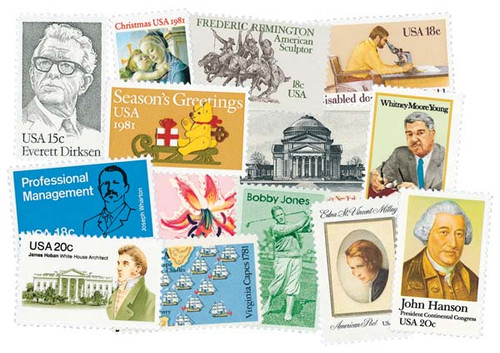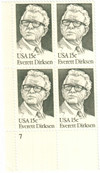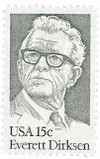
# 1874 - 1981 15c Everett Dirksen
U.S. #1874
1981 15¢ Everett Dirksen
- Issued on Dirksen’s 85th birthday
- Issued at the Dirksen Center, dedicated informing the public about the US Congress
Stamp Category: Commemorative
Value: 15¢
First Day of Issue: January 4, 1981
First Day City: Pekin, Illinois
Quantity Issued: 160,155,000
Printed by: Bureau of Engraving & Printing
Printing Method: Engraved
Format: Panes of 50 in sheets of 200
Perforations: 11
Color: Gray
Why the stamp was issued: To commemorate the 85th birthday of stateman Everett Dirksen.
About the stamp design: This was the first stamp design for Ron Adair. He based the portrait on a photo taken by David Douglas Duncan in 1968, one year before Dirksen’s death.
First Day City: The First Day ceremony for this stamp was held at the Dirksen Center in Pekin, Illinois. The Dirksen Center, located in Dirksen’s hometown, was founded in 1973 to promote “research and scholarship to advance the public understanding of the U.S. Congress.”
History the stamp represents: Statesman Everett McKinley Dirksen was born on January 4, 1896, in Pekin, Illinois.
Born to German immigrants, Dirksen had a fraternal twin and another brother. His father died when he was just nine years old. The Dirksen family farm was on the outskirts of Pekin in an area known as Beantown because they grew beans instead of flowers.
After receiving his early education, Dirksen briefly attended the University of Minnesota Law School. He then left school to join the Army in World War I. During the war, he served as a second lieutenant in a field artillery battery.
After WWI, Dirksen explored a variety of business and personal interests. He invested in an electric washing machine business, ran a bakery with his brothers, and wrote short stories and plays. He also became an active member of the American Legion, which helped him to develop his public speaking skills.
Dirksen entered politics in 1926 when he was elected to the Pekin City Council. Having received the most votes of the eight candidates, Dirksen was also made Pekin’s commissioner of accounts and finance. He served in both roles until 1931.
In 1932, Dirksen won a congressional seat and was then re-elected seven times. During his tenure, Dirksen studied law on his own and was admitted to the bar in the District of Columbia and Illinois. He supported many of Franklin Roosevelt’s New Deal programs and lobbied for additional staff during World War II. Dirksen then helped pass an amendment to the Lend-Lease Act that gave the House and Senate the authority to revoke powers given to the president.
Dirksen briefly left politics in 1948 but returned after just two years when he was elected to represent Illinois in the Senate in 1950. Dirksen became known for his keen political skills and over-the-top speaking, which earned him the nickname “The Wizard of Ooze.”
Dirksen was elected Senate Minority Leader in 1959 and held that position until his death. In that role, he worked to unite different groups within the Republican Party, namely by giving younger members more representation in the Senate and better appointments. Dirksen became one of the most vocal members of Republican Party during the 1960s, appearing on television frequently. He supported President Lyndon Johnson’s decision to escalate the war in Vietnam.
Dirksen was also crucial to the passage of 1960s Civil Rights legislation. In 1964, Southern Democrats led a 54-day filibuster to prevent the passage of the Civil Rights Act of 1964. Dirksen, along with two other senators, created a new bill in the hopes that it could swing enough votes to stop the filibuster. After much debate and the introduction of an amendment, the act was approved and the filibuster ended.
In addition to his political career, Dirksen recorded four spoken-word albums. For this work, he won a Grammy for Best Documentary Recording and became the oldest person at the time to appear on the Billboard Hot 100’s top 40.
In August 1969, Everett discovered he had lung cancer. Although he had it removed, he suffered complications and died on September 7, 1969.
U.S. #1874
1981 15¢ Everett Dirksen
- Issued on Dirksen’s 85th birthday
- Issued at the Dirksen Center, dedicated informing the public about the US Congress
Stamp Category: Commemorative
Value: 15¢
First Day of Issue: January 4, 1981
First Day City: Pekin, Illinois
Quantity Issued: 160,155,000
Printed by: Bureau of Engraving & Printing
Printing Method: Engraved
Format: Panes of 50 in sheets of 200
Perforations: 11
Color: Gray
Why the stamp was issued: To commemorate the 85th birthday of stateman Everett Dirksen.
About the stamp design: This was the first stamp design for Ron Adair. He based the portrait on a photo taken by David Douglas Duncan in 1968, one year before Dirksen’s death.
First Day City: The First Day ceremony for this stamp was held at the Dirksen Center in Pekin, Illinois. The Dirksen Center, located in Dirksen’s hometown, was founded in 1973 to promote “research and scholarship to advance the public understanding of the U.S. Congress.”
History the stamp represents: Statesman Everett McKinley Dirksen was born on January 4, 1896, in Pekin, Illinois.
Born to German immigrants, Dirksen had a fraternal twin and another brother. His father died when he was just nine years old. The Dirksen family farm was on the outskirts of Pekin in an area known as Beantown because they grew beans instead of flowers.
After receiving his early education, Dirksen briefly attended the University of Minnesota Law School. He then left school to join the Army in World War I. During the war, he served as a second lieutenant in a field artillery battery.
After WWI, Dirksen explored a variety of business and personal interests. He invested in an electric washing machine business, ran a bakery with his brothers, and wrote short stories and plays. He also became an active member of the American Legion, which helped him to develop his public speaking skills.
Dirksen entered politics in 1926 when he was elected to the Pekin City Council. Having received the most votes of the eight candidates, Dirksen was also made Pekin’s commissioner of accounts and finance. He served in both roles until 1931.
In 1932, Dirksen won a congressional seat and was then re-elected seven times. During his tenure, Dirksen studied law on his own and was admitted to the bar in the District of Columbia and Illinois. He supported many of Franklin Roosevelt’s New Deal programs and lobbied for additional staff during World War II. Dirksen then helped pass an amendment to the Lend-Lease Act that gave the House and Senate the authority to revoke powers given to the president.
Dirksen briefly left politics in 1948 but returned after just two years when he was elected to represent Illinois in the Senate in 1950. Dirksen became known for his keen political skills and over-the-top speaking, which earned him the nickname “The Wizard of Ooze.”
Dirksen was elected Senate Minority Leader in 1959 and held that position until his death. In that role, he worked to unite different groups within the Republican Party, namely by giving younger members more representation in the Senate and better appointments. Dirksen became one of the most vocal members of Republican Party during the 1960s, appearing on television frequently. He supported President Lyndon Johnson’s decision to escalate the war in Vietnam.
Dirksen was also crucial to the passage of 1960s Civil Rights legislation. In 1964, Southern Democrats led a 54-day filibuster to prevent the passage of the Civil Rights Act of 1964. Dirksen, along with two other senators, created a new bill in the hopes that it could swing enough votes to stop the filibuster. After much debate and the introduction of an amendment, the act was approved and the filibuster ended.
In addition to his political career, Dirksen recorded four spoken-word albums. For this work, he won a Grammy for Best Documentary Recording and became the oldest person at the time to appear on the Billboard Hot 100’s top 40.
In August 1969, Everett discovered he had lung cancer. Although he had it removed, he suffered complications and died on September 7, 1969.










